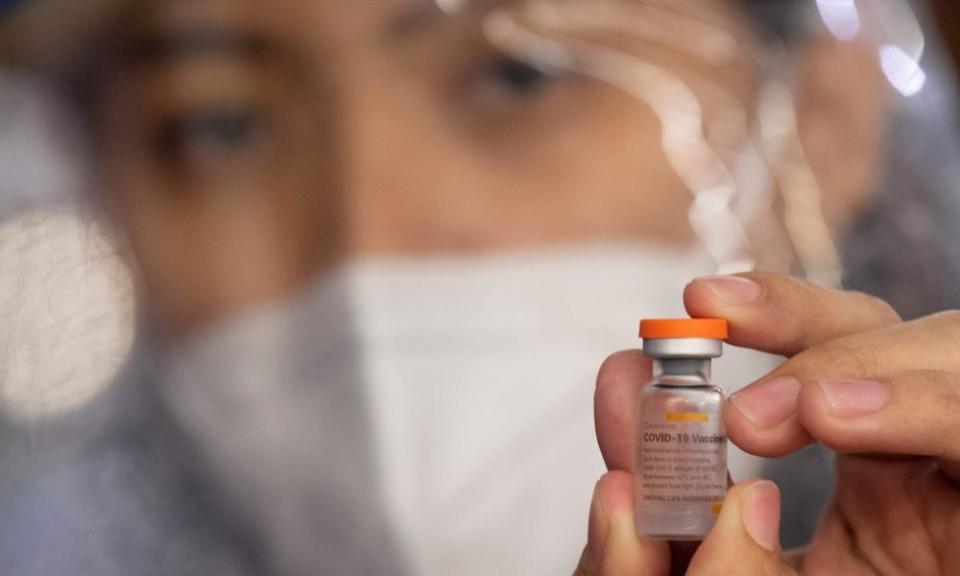China and the west must now cooperate to achieve global Covid vaccine coverage

“Vaccine diplomacy” has evolved into a dirty phrase, not least in relation to China and the notion that its government could be exchanging ineffective jabs for geopolitical capital. At the weekend the G7 pledged just 1bn of the 11bn vaccines needed to immunise low- and middle-income countries, suggesting that the west cannot vaccinate the world alone. But, over the past month, international scientific and public health authorities have confirmed an exciting finding: that, despite the doubts of some critics, vaccines made by Chinese companies actually work. While they may remain ideological adversaries, China and the west now have no choice but to collaborate on vaccinating the world.
On 2 June, the World Health Organization finally approved Sinovac for emergency use. Just days earlier, China’s largest state-owned pharmaceutical manufacturer, Sinopharm, had released peer-reviewed phase III clinical trial data proving its vaccine’s efficacy to western sceptics – and had it published in the the Journal of the American Medical Association, no less. Phase III’s “golden seal” means that each vaccine is effective enough to be widely distributed. But critical gaps in safety data for patients over the age of 60 remain for both Sinovac and Sinopharm jabs. While significant, these data holes notably did not deter a major approval from the world’s highest public health authority. With only 6% of the globe fully vaccinated, the need for doses clearlyoutweighs the risks the vaccines may pose.
Both jabs’ efficacy has been publicly doubted; most recently when the UAE began offering a third Sinopharm “booster shot”. Vaccines produced in China – alongside the Chinese Military Academy of Medical Sciences’ partner producer CanSinoBio – have been largely ignored by the WHO’s Covax initiative, a multilateral attempt to vaccinate the developing world. According to reports, Sinopharm and Sinovac could have been clearer about dose availability or production capacity earlier on if they really wanted a bigger seat at the Covax table. But since April, the tragic Covid-19 situation in India has made doses from Covax’s largest supplier, Oxford/AstraZeneca, impossible to procure. Particularly in light of the underfunding pledged by leaders of G7 countries, the WHO has had little choice but to ask Sinopharm – and now Sinovac – for help, as the initiative trudges along towards vaccinating the world.
If vaccines made in China could support gaps in Covax, then, what’s left of China’s vaccine diplomacy? Beijing is trying to halt the narrative that it wields doses for political power. The phrase “vaccine diplomacy” now only appears in Chinese media when it’s being used to condemn western commentary on the topic; a practice that China’s leading state-run news agency Xinhua calls “sinister”. Some of the Chinese population are increasingly concerned that vaccine diplomacy is becoming another “wolf warrior”, a phrase that many consider overtly demonising of China’s influence abroad. Users on Chinese social media giants WeChat, Weibo, and DouYin are actually more inclined to use the phrases “vaccine assistance” or “vaccine donation”.
Thus far, Chinese vaccination donations abroad have been conducted bilaterally rather than through Covax. However, framing win-win vaccine distribution as topping up Beijing’s moral currency reserves is a careful choice linked directly to China’s stated foreign policy aims. The language of China’s “International Development Cooperation in the New Era” white paper, launched in January, paints China as a developing nation that considers its homemade vaccines as a “global public good”. Its draft 14th five-year plan, published in March, alludes to financial motivations for vaccine diplomacy, citing the nation’s hopes to become a global pharmaceutical tech leader.
Outside the west, coverage has been mixed on the usage of Chinese-made vaccines. Some has been outright political, including coverage of China pressuring Paraguay, Honduras and other nations to cut ties with Taiwan in exchange for doses, or delayed dose distribution of Chinese-made vaccines in south-east Asia. Headlines in the Middle East have reflected a more moderate approach. They have thanked China for its generosity and reflected efficacy scepticism. Amplified anxieties surrounding the blood clot concerns over AstraZeneca pushed many in the region to choose Sinopharm as a “safer dose”.
Chinese-made vaccines may have increased the nation’s soft power abroad; however, reducing the conversation to purely political motivations extrapolated via headlines ignores hard truths. Vaccine hoarding by the west during the pandemic’s early months put Covax far behind its target of vaccinating 2.3 billion people by the end of the year. China’s vaccine factories can generate 3bn vaccines a year and have already exported 250m while the US is just getting started. Further, Covax’s total aim is to vaccinate just 20% of people from lower- and middle-income countries by the end of the year, leaving 80% of the market up for grabs by corporate interests. This could be an extraordinary opportunity to spread global wealth. Manufacturing of Chinese companies’ vaccines overseas may benefit diverse economies across Indonesia, Egypt and, most notably, the UAE, where Sinopharm has already been rebranded as Hayat-Vax.
When it comes to vaccines, G7 countries’ adversarial attitude towards China must take a moral pause. Covax and international governments looking for doses should increase collaboration, rather than competition, with vaccine companies across the world – including those in China. At worst, continuing to question Sinopharm and Sinovac’s efficacy may increase vaccine hesitancy. While rightly delayed on the grounds of data, late approval for Sinopharm and Sinovac’s vaccines undoubtedly cost many lives globally.
After a year and a half of pandemic madness, the world is tired of blurred lines between proof and politics. While the west and China may remain adversaries, global public health initiatives must be careful to keep putting evidence and necessity – rather than geopolitical rivalry – first.
Sophie Zinser is a Schwarzman Academy fellow at Chatham House

 Yahoo Finance
Yahoo Finance 